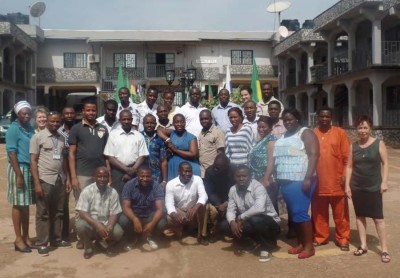The 43rd PBF course finished in Sierra Leone at the 31st of January 2015. The course for 28 participants came exactly at the right moment when Sierra Leone also started reviewing its post-Ebola recovery program.
The current PBF “light” approach in Sierra Leone has achieved encouraging results. Yet, there are design problems and challenges such as the weak capacity to contract, verify and coach the health facilities and the unclear separation of functions in particular between regulation and contracting.
In line with the TOR the course participants conducted a review and feasibility scan of the current PBF system and proposed improvements for the next PBF PLUS phase.
Recommendations:
- Strengthen the existing PBF system by applying best practices and instruments.
- Increase the current annual budget of USD 3.2 million to USD 24 million per year. This would increase the current per capita PBF spending from USD 0.50 to USD 4.00 per capita (best practice) and hence also account for certain elements of the Free Health Care Initiative. This is not necessarily fresh finding but might also include the reallocation of existing input budget lines such as for essential drugs, equipment and infrastructure.
- Contribute to health system strengthening in the post-Ebola recovery strategy.
- Increase the quality of care through a whole set of quality improvement measures including performance incentives for the various functions in the health system.
- To allow for efficient use (more value for money) and better coordination of available funds such as from the government, partners and private out-of-pocket expenditures.
- Encourage good governance and increase the accountability through the separation of functions and improved verification & auditing mechanisms.
- To strengthen public-private-partnerships at the providers level, organising CDV agencies and selecting local NGOs for community verification.
- To strengthen the regulatory role of the Government of Sierra Leone through its MDAs and clearly defined relationships with the stakeholders (providers, community voice, verification agencies, payment agencies, partner organizations and civil society organisations).
Once the above recommendations are applied, international comparative experiences shows that the quality, efficiency and equity of the health services would greatly improve, and the system’s resilience in times of crisis hugely enhanced. It would restore the confidence of the population in the health system. Sierra Leone has the potential to become one of the PBF frontrunner countries in English-speaking Africa.




